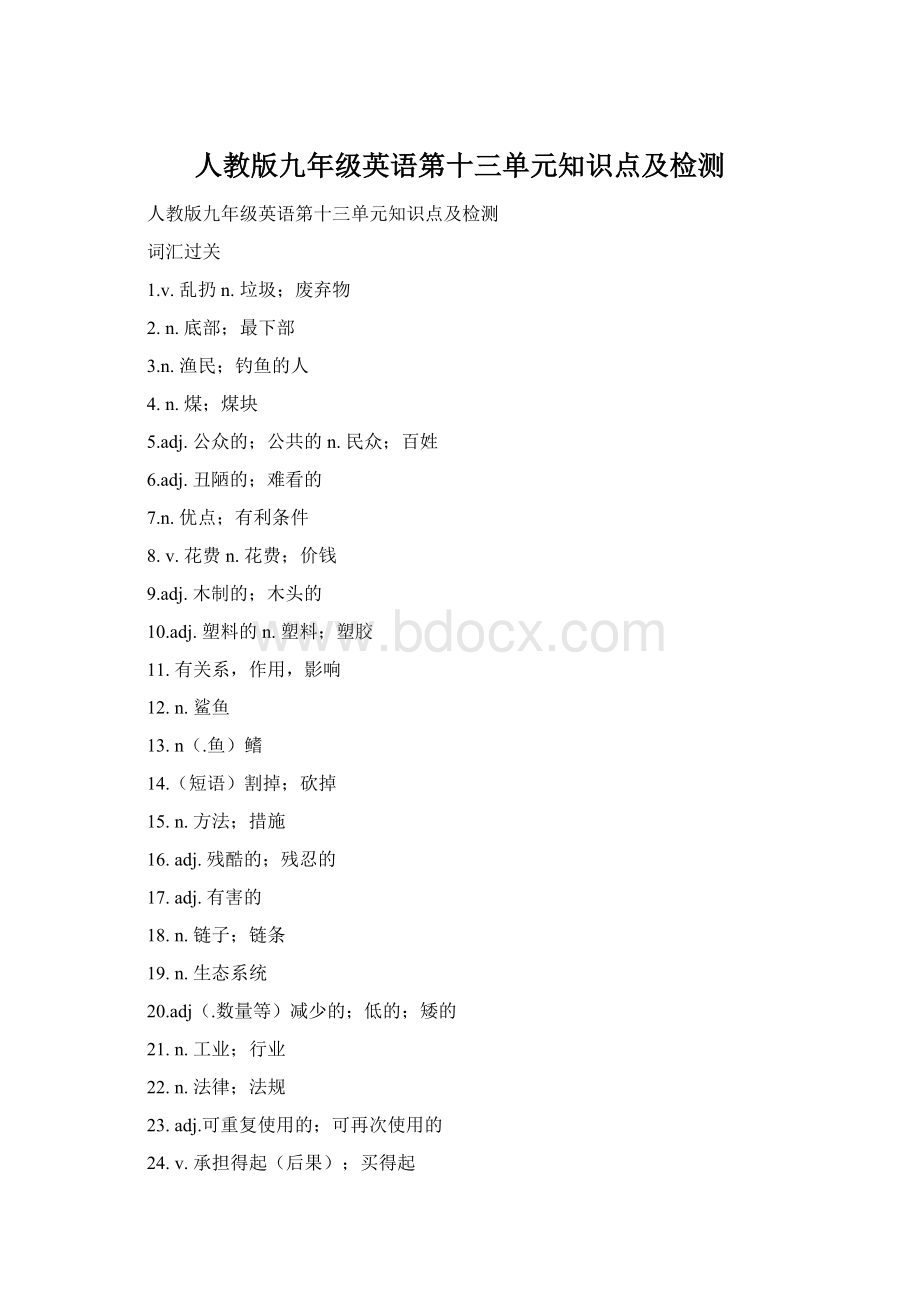人教版九年级英语第十三单元知识点及检测文档格式.docx
《人教版九年级英语第十三单元知识点及检测文档格式.docx》由会员分享,可在线阅读,更多相关《人教版九年级英语第十三单元知识点及检测文档格式.docx(13页珍藏版)》请在冰豆网上搜索。

19.n.生态系统
20.adj(.数量等)减少的;
低的;
矮的
21.n.工业;
行业
22.n.法律;
法规
23.adj.可重复使用的;
可再次使用的
24.v.承担得起(后果);
买得起
25.n.运输业;
交通运
26.v.回收利用;
再利用
27.n.餐巾;
餐巾纸
28.(短语)颠倒;
倒转
29.n.大门
30.n.瓶;
瓶子
31.n.负责人;
主席;
总统
32.n.灵感;
鼓舞人心的人(或事物
33.n.金属
34.n.创造力;
独创性
一.本单元语法复习:
(1)现在进行时
(1)含义:
表示正在发生或进行的动作。
(2)基本结构:
主语+be+现在分词(be的形式随主语的变化而变化)
(3)基本用法:
①表示现在正在进行的动作。
特征:
常常与now或具体的时间连用,有时句中会有感官动词来提示,或通过上下文来暗示。
②表示现阶段一直进行的动作。
这类动词常常是延续性动词。
常于atpresent,thisweek,thesedays等连用。
③表示主语的特征、性格、能力等
(2)现在完成时
表示过去发生的动作对现在还有影响。
主语+have/has+过去分词
①表示过去发生的动作,但强调对现在产生影响。
不能与表示具体的时间状语连用。
②表示过去发生的动作或存在的状态一直延续到现在,还可能继续下去。
常常与since,for,inthepast+时间名词,inthelast+时间名词等时间状语连用,而且谓语动词要求是延续性动词。
③表示一种“经历或体验”,即可以表示经历过也可以是从来都没有经历过。
(3)被动语态
归纳如下(三种红色要求熟练掌握,其余为了解)
(1)一般现在时是被动语态:
am/is/are+过去分词
(2)现在完成时的被动式:
have/has+been+过去分词
(3)现在进行时的被动式:
am/is/are+being+过去分词
(4)一般过去时的被动式:
was/were+过去分词
(5)过去进行时的被动式:
was/were+being+过去分词
(6)过去完成时的被动式:
had+been+过去分词
(7)一般将来时的被动式:
will/begoingtobe+过去分词
(8)含有情态动词的被动式:
情态动词+be+动词的过去分词。
(4)情态动词
情态动词表示说话人对某一动作或状态的态度,如认为“可能”、“应当”、“必要”等。
情态动词本身有一定的意义,但不能单独作谓语,也没有人称和数的变化。
后面一般跟动词原形。
Ø
(5)usedto结构
usedto意为“过去常常做某事”,指的是过去的习惯性动作,目的在于与现在形成对照。
usedto是个情态动词,其中的to是不定式符号,后面跟动词原形。
在美式英语中。
它的疑问式是:
Did+主语+usetodosth.?
否定式是:
主语+didn'
tuse..。
在英式英语中,它的疑问式应当是:
Used+主语+tosth.?
否定式应当是usednotto或use(d)n'
tto。
Heusedtostayuplate.他过去常熬到很晚。
usedto结构
usedto意为“过去常常做某事”,指的是过去的习惯性动作,目的在于与现在形成对照。
在美式英语中(掌握)
Did+主语+usetodosth.
tuse.
在英式英语中(了解)
它的疑问式应当是:
Used+主语+tosth.
否定式应当是usednotto.
二Languagepoints
1.harmful形容词,意为“有害的”。
常构成短语
beharmfulto“对……有害的”。
Stayingupoftenisharmfultoyourhealth.经常熬夜对你的健康有害。
【拓展】
harm名词,意为“害处”。
常用构成短语
doharmto“对……有害”,相当于beharmfulto.
Toomuchsmokingdoesharmtohishealth.=Toomuchsmokingisharmfultohishealth.吸烟过多对他的健康有害。
2.辨析:
join,joinin和takepartin
join
加入组织,团体,党派等,有作为其中的一个成员的含义;
后面也可以加表示人的名词,表示和某人一起参加某活动
joinin
加入一种具体活动。
takeaprtin
指参加会议或群众性活动等,着重说明句子主语参加该项活动并在活动中发挥作用。
例如:
Willyoujoinusinthediscussion?
你参加我们的讨论吗?
ShejoinedtheYoungPioneers.她加入了少先队。
Whydidn'
tyoujoininthetalklastnight?
昨晚你为什么没参加座谈?
Didyoutakepartinthesportsmeet?
你参加运动会了吗?
3.afford的用法
⑴afford是动词,意为“买得起,担负得起”,通常与can,could,beableto连用,多用于否定句中。
•Theycouldn’tafford$50foraticket.他们拿不出50美元买一张票。
⑵afford后面常跟带to的动词不定式。
•Wecan’taffordtogoabroadthissummer.今年夏天我们没有足够的钱出国。
4.Notonly…butalso…意为“不但…而且…”
遵循一下三个原则
(a)并列连词,连接两个并列成分,其中also可以省略。
(b)主谓一致原则:
notonly…butalso..连接两个主语时,谓语动词在人称和数上要与butalso的主语保持一致。
c)倒装原则:
notonly…butalso…连接两个并列分句时,notonly置于句首,表示强调,其引导的句子要用部分倒装,即将谓语动词的一部分(情态动词,助动词等)放在句子的前面,而butalso后的句子用正常语序。
•NotonlyhebutalsoIaminterestedinpopmusic.
•NotonlydoIfeelgoodabouthelpingpeople,butalsoIgettospendtimedoingwhatIlovetodo.
5.辨析:
needtobedone;
needdoing与needtodo
⑴needdoing=needtobedone"
需要被…"
现在
分词doing表被动“需要被做”,相当于need
tobedone。
Mywatchneedsrepairing.=Mywatchneeds
toberepaired.我的表需要修了。
⑵need后加不定式,证明need为实义动词,而
非情态动词,这时need有人称和数的变化。
Heneedstogetupearly.他需要早起
检测题
二、单项填空
1.Idon'
tthinkyou'
vebeentoDisneyland,________?
A.haveyouB.haven'
tyouC.doyou
2.Thevillagerbuiltthebridge________stoneslastyear.
A.outofB.outC.to
3..Wastepapermustbe________gooduse.
A.putB.puttoC.toput
4.—DoyouknowthemovieHarryPotter?
—Yes.I________ittwice.It'
sfunny.
A.sawB.seeC.haveseen
5.Morenaturalprotectionareasshould________inthefuture.
A.setupB.tosetupC.besetup
6.—Doyoulikeplayingcomputergames?
—No,butI________.
A.usedtoB.don'
tC.do
7.Ihavenever________thestrangeanimalbefore.
A.heardfromB.listenedC.heardof
8.—MissLiu,whendidyoucomehere?
—In2012.I________herefortwoyears.
A.havebeentoB.havegonetoC.havebeen
9.Lotsoffoodandwater________toYa'
an,SichuanProvinceimmediatelyaftertheearthquakehappened.
A.weresentB.aresentC.sent
10.Thechildrenwerehungryandthesaladwasquickly________up.
A.eatingB.ateC.eaten
11.Look,somanypassengers________withtheirsmartphonesontheunderground.
A.playedB.willplayC.areplaying
12.Greatchanges________inDaqingsincethe1990s.
A.tookplaceB.weretakenplaceC.havetakenplace
13.—Howmuchdoesthecar________?
—Oh,that'
snottoodear.It'
sonly100,000yuan.
A.spendB.costC.take
14.—Haveyou________theschoolsportsmeeting?
—Yes,Ihave.
A.takepartB.takenpartC.takenpartin
16.—John,yourroomisreallyinamess.Itneeds________.
—Sorry,Mum.I'
lldoitatonce.
A.cleanedB.tobecleanedC.toclean
18.Heusedto_____inthesun,butnowheisusedto______atnight.
A..reading,readingB.reading,readC.read,reading
19.AmyHayesisgoodatrecycling.Sheisaninspirationto_________.
A.allusB.allweC.usall
20._____downairpollution,weshouldtakethebusorsubwayinsteadofdriving.
A.CutB.TocutC.Cutting
21.Thereis____rubbishandwaste.Peoplearethrowingawaythingseveryday.
A.toomuchB.toomanyC.muchtoo
22.—Theairhasbecomereallypollutedaroundhere..
—Yes,Iusedto_______seestarsinthesky.
A.canB.beabletoC.must
23.Myfatherusuallydrivestowork_______takingabus.
A.insteadofB.insteadC.becauseof
24.NotonlyJackbutI_____proudofmyschool
A.isB.amC.are
25.Thebikeistooexpensive.Ican’t______tobuyit
A.effortB.affordC.keep
26.He_______therewithhismother________.
A.hasgone,fortwodays
B.went,intwodays
C.went,justnow
27.Theheavysnowdidn’t_______theinternationalairlines.
A.payattentiontoB.addtoC.makeadifferenceto
28.Hedoesn’tdohishomework_______.Sohealwaysmakessomemistakes.
A.carefulenoughB.enoughcarefulC.carefullyenough
29.Ihavetriedseveraljackets,but_______ofthemfitsmewell.
A.allB.neitherC.none
30.Lookatthatsign.Smokinghere.
A.isn’tallowedB.doesn’tallowC.aren’tallowed
31.Myfather___toBeijingonbusiness.Hewillbebackhomeintenminutes.
A.hasbeenB.hasgoneC.willgo
32.Mr.Greenteaches_______computerscience.
A.weB.usC.our
34.It’ssaidthatpetrol(石油)________inlessthan100years.Soweshouldtrytowalkmoreinsteadofdrivingcars.
A.usedforB.willbeusedupC.usedup
35.Pleasethelightswhenyougoout.
A.turnupB.turndownC.turnoff
36.—Doyoutakeexerciseeveryday?
—Yes.Ialways_______thirtyminutesaftersupper.
A.spendB.costC.take
38..—Haveyou_____aclub?
—Yes,I’minaswimmingclubandIoften_____theswimmingtraining.
A.joined;
takepartinB.joined;
join
C.takenpartin;
39.MissTaylorneverwastesmoneyonanythingtooexpensive,eventhoughshecan_____to.Shehasdonatedmuchofthemoneyshesavedtocharities.
A.affordB.allowC.remind
41.Notonly________dancewell,buthesingsverywell.
A.hedoesB.doesheC.he
42.Ithinksimplethingslikebike________canhelptokeephealthy.
A.rideB.ridingC.toride
43.Hisworkreally________inthefactory.
A.adifferenceB.makesdifferenceC.makesdifferent
44.Thenumberofthestudentsinourschool________inthelastfewyears.
A.hasfallenB.fellC.hasfell
45.—CouldIhavealookatyourpictures?
—Yes,ofcourseyou________.
A.couldB.canC.will
46.—________you________yourhomeworkyet?
—Yes.I________itamomentago.
A.Did;
do;
finished
B.Have;
done;
havefinished
C.Have;
47.Foodsafetyisimportant.Rules________toprotectpeoplefromfoodpollution.
A.mustmakeB.mustbemadeC.can'
tbemade
48.—Whoisthelittlegirlinthepicture?
—It'
sme.Thepicture________10yearsago.
A.tookB.wastakenC.hastaken
49.Accordingtoourplan,anewteachingbuilding________.
A.willbuildB.willbebuiltC.isbuilt
50.Manyoldhousesaroundourschoolwillbe________downnextyearandalargegreenareawillappear.
A.thrownB.pulledC.put
51.—Haveyouhadyourbreakfastyet?
—No.Mom________itformenow.
A.wascookingB.iscookingC.cooks
52.MissLin________alotofworkforthepoorareasince2010.
A.doesB.didC.hasdone
53.Thereused________asmallriverinfrontofmyhouse.Thewaterinitwasclean.
A.beB.tobeC.tobeing
54.—HowlongcanI________thebook?
—Fortwoweeks.
A.keepB.borrowC.lend
55.Thefilmhad________fortenminuteswhenI________tothecinema.
A.beenon;
gotB.begun;
gotC.beenon;
get
56.—It'
sdifficulttogettotheothersideoftheriver.
—Ithinkabridge________overtheriver.
A.shouldbebuiltB.shouldbuild
C.willbuild
57.—Mustwewearourschooluniformthisafternoon?
—No,you________.Allofuswillgoonanouting.
A.mustn'
tB.can'
tC.needn'
t
58.Theoldmanlivesinahouse________wasbuiltoutofthestones.
A.thatB.whatC.where
59.SongZuyingisknown________asinger.
A.forB.asC.to
60.We________youtohaveagoodtrip.
A.wishB.hopeC.wishwith
三.(A)的适当形式填空(10分)
1.Pleasestopthechildrenfrom_____(play)footballinthestreet.
2.Italyisoneoftheold_____(city)inEurope.
3Therewillbemuch_____(little)thantodayinthefuture.
4.Don’t_____(climb)thetrees.It’sdangerous,Jim.
5.Iamscaredof_____(go)outaloneatnight.
6.Whatabout______(go)swimming.
7.Theyareall______(interest)in